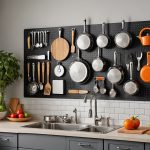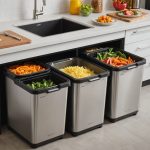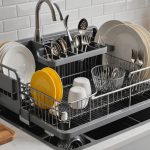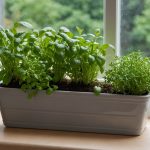Transform Your Kitchen Design with Recycled Materials: A Sustainable and Stylish Choice
When it comes to kitchen renovation, many of us are looking for ways to make our space not only stylish but also sustainable. Using recycled materials is an excellent way to achieve this, and it’s more accessible than you might think. Here’s a comprehensive guide on how to transform your kitchen with recycled materials, making it a modern, eco-friendly, and beautiful space.
Why Choose Recycled Materials for Your Kitchen?
Choosing recycled materials for your kitchen is a decision that benefits both your home and the environment. Here are some compelling reasons to make the switch:
Also read : Window sill wonders: your ultimate guide to growing a thriving herb garden in miniature greens
Environmental Benefits
Recycled materials significantly reduce the need for extracting and processing raw materials, which can be energy-intensive and harmful to the environment. For instance, recycled glass and ceramics can be used to create stunning countertops that would otherwise end up in landfills[1].
Cost-Effective
While some recycled materials might seem pricey at first glance, they often offer long-term savings. For example, bamboo worktops, which are highly renewable and require minimal maintenance, can be as cost-effective as traditional materials over time[2].
This might interest you : Ultimate kitchen wellness: your comprehensive guide to effortlessly installing a water filtration system
Unique Style
Recycled materials can add a unique touch to your kitchen design. A countertop made from recycled glass or quartz can have a distinct look that sets your kitchen apart from others.
Popular Recycled Materials for Kitchen Worktops
Here are some of the most popular recycled materials you can use for your kitchen worktops, each with its own set of advantages and disadvantages.
Recycled Glass and Ceramic Countertops
These countertops are made from a combination of recycled glass, ceramics, and other materials, bound together by a resin. Here are some key points to consider:
- Eco-Friendly: Composed of at least 75% recycled materials, these countertops are a great choice for those looking to reduce their environmental footprint[1].
- Durable: Resistant to stains and easy to maintain.
- Versatile: Available in various colors, textures, and opacities.
- Price: $100 to $300 per square foot.
Recycled Quartz Countertops
Recycled quartz countertops are another excellent option, combining the durability of quartz with the sustainability of recycled materials.
- Antimicrobial Properties: Quartz is known for its resistance to bacteria and other microorganisms.
- Heat and Scratch Resistant: Quartz is one of the hardest materials available, making it ideal for kitchen worktops.
- Easy Maintenance: Non-porous and easy to clean.
- Price: $50 to $150 per square foot[1].
Bamboo Kitchen Worktops
Bamboo is a highly renewable resource that makes for an excellent kitchen worktop material.
- Renewable Resource: Bamboo grows rapidly, often in just 3-5 years, making it a highly sustainable choice[2].
- Durable: Bamboo is strong and can handle scratches and dents well.
- Natural Antimicrobial Properties: Bamboo has natural antimicrobial properties, making it a healthier choice for your kitchen.
- Price: $40 to $100 per square foot.
Comparison of Recycled Materials for Kitchen Worktops
Here’s a detailed comparison of some of the recycled materials you can use for your kitchen worktops:
| Material | Eco-Friendly | Durability | Maintenance | Price Range (per sq. ft.) | Unique Features |
|---|---|---|---|---|---|
| Recycled Glass/Ceramic | Yes | High | Easy | $100-$300 | Unique textures and colors, antimicrobial properties |
| Recycled Quartz | Yes | Very High | Easy | $50-$150 | Heat and scratch resistant, non-porous |
| Bamboo | Yes | High | Moderate | $40-$100 | Rapidly renewable, natural antimicrobial properties, light and easy to install |
| Recycled Concrete | Yes | High | Moderate | $50-$150 | Low maintenance, eco-friendly, can be customized |
| Recycled Metal (Stainless Steel) | Yes | Very High | Easy | $75-$150 | Non-porous, resistant to heat and water, modern look |
How to Incorporate Recycled Materials into Your Kitchen Design
Incorporating recycled materials into your kitchen design is not just about the worktops; it’s about creating a cohesive and sustainable space. Here are some tips to help you get started:
Lighting
Using energy-efficient lighting can significantly reduce your kitchen’s carbon footprint. Consider installing LED lights or skylights to maximize natural light.
Cabinets and Storage
Opt for cabinets made from recycled wood or sustainable materials. This not only reduces waste but also adds a unique touch to your kitchen.
Flooring
Choose flooring materials that are sustainable and eco-friendly, such as bamboo or reclaimed wood. These materials are not only stylish but also durable.
Chopping Boards and Accessories
Use chopping boards and accessories made from recycled materials. For example, a bamboo chopping board is both functional and eco-friendly.
Practical Tips for a Budget-Friendly Kitchen Renovation
Renovating your kitchen with recycled materials doesn’t have to break the bank. Here are some practical tips to make your renovation budget-friendly:
Plan Ahead
Before starting your renovation, plan carefully. Measure your space, decide on the materials you want to use, and create a budget.
Shop Smart
Look for materials that are on sale or consider buying second-hand. Websites like Craigslist or local thrift stores can be great resources for finding affordable materials.
DIY Projects
Consider taking on some DIY projects to save money. For example, you can refinish old cabinets or create your own lighting fixtures.
Elevate Your Kitchen with Modern and Sustainable Design
Creating a modern and sustainable kitchen is all about balance. Here’s how you can elevate your kitchen design with recycled materials:
Modern Style
A modern kitchen often features clean lines, minimal decor, and a focus on functionality. Using materials like recycled quartz or stainless steel can give your kitchen a sleek, modern look.
Natural Elements
Incorporate natural elements into your design. Bamboo worktops or reclaimed wood cabinets can add warmth and texture to your kitchen.
Functional Space
Ensure your kitchen is functional. Use recycled materials to create a chopping board station or a kitchen island that serves multiple purposes.
Quotes and Insights from Experts
Here are some insights from experts in the field:
- “Bamboo is a game-changer for kitchen worktops. It’s eco-friendly, durable, and has natural antimicrobial properties,” says a representative from Teragren Bamboo Countertops[2].
- “Recycled materials are not just good for the environment; they also offer unique design opportunities. You can create a truly one-of-a-kind kitchen with these materials,” notes an interior designer.
Transforming your kitchen with recycled materials is a great way to create a sustainable, stylish, and functional space. Whether you choose recycled glass, quartz, bamboo, or another material, you’re making a choice that benefits both your home and the environment.
By incorporating these materials into your kitchen design, you’re not only reducing waste but also creating a space that is modern, eco-friendly, and beautiful. So, why not make the switch and transform your kitchen into a sustainable haven that you’ll love spending time in? With the right materials and a bit of creativity, you can create a kitchen that is truly unique and friendly to the planet.











